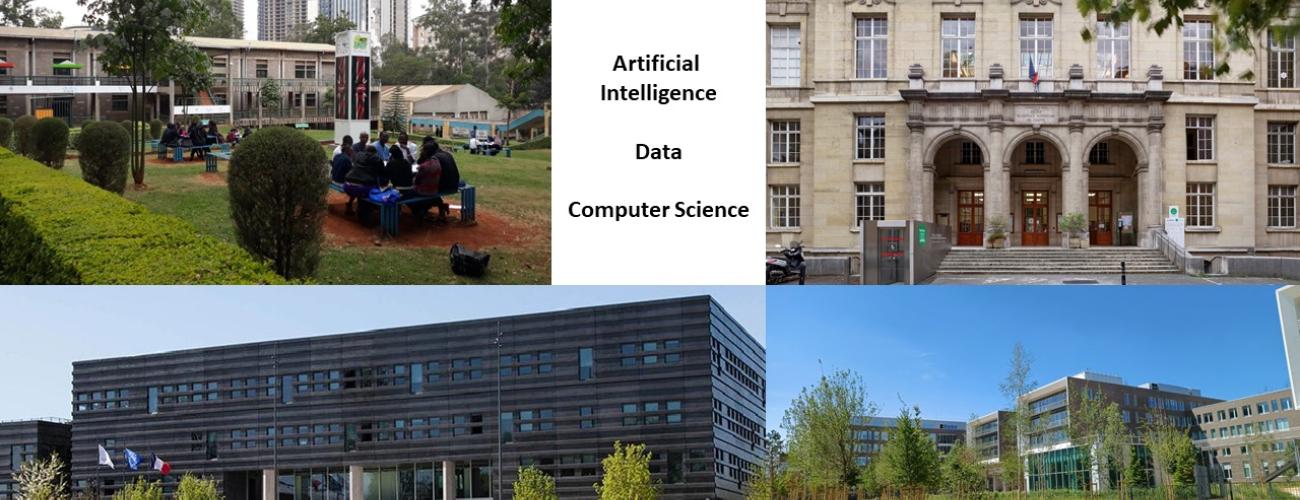
Speed Dating Workshop « Computer Science, Data and Artificial Intelligence » Paris – Nairobi
Strategic partnership between the University of Nairobi, ParisTech and CentraleSupélec
At the beginning of July, the University of Nairobi, the graduate engineering schools of the ParisTech network - AgroParisTech, Chimie ParisTech, École des Ponts ParisTech, Mines Paris - and CentraleSupélec launched a tripartite partnership dedicated to accompanying the University in its university-business relations as part of the construction of the Engineering and Science Complex. In December, the partners decided to launch a series of workshops between scientists. The first "speed dating" event took place on Thursday March 7.
On March 7, the University of Nairobi, Chimie ParisTech, AgroParisTech and CentraleSupélec met online with around 30 researchers in computer science, data science and artificial intelligence. This was the first workshop in which the participants discovered the work of the partner institutions.
After an introduction by Marc Zolver, International Technical Expert at the University of Nairobi, and a tour de table, the researchers presented their work in just a few minutes:
Chimie ParisTech opened the ball with
- François-Xavier Coudert (IRCP/COCP) : Data-based discovery of novel materials
- Thijs Stuyver (I-CLeHS/CTM) : Combining chemical theory and machine learning techniques to accelerate chemical discovery, et
- Carlo Adamo (I-CLeHS/CTM) : Machine Learning techniques for the prediction of molecular chemical and physical properties
The researchers explained how they were using artificial intelligence to enrich their methods of discovering new materials, while highlighting the fact that AI feeds on what already exists, but that scientific publications very rarely trace failures. There are therefore significant biases in the material available to feed AI. They have shown the importance of bridging the gap between modeling, i.e. theory, and experimentation to verify what is envisaged in the modeling. And finally, the role that AI can play in verifying data supplied by manufacturers in application of the European REACH regulation.
CentraleSupélec took up the baton with
- Francesca Bugiotti, Department of Computer science: Data modeling for Artificial Intelligence, who presented three case studies (European VRAILEXIA project to help dyslexic students, graphical representation of data in the energy sector and more specifically in oil extraction, a project with CEA)
- Jean-Christophe Pesquet, Director of the Centre for Computational Vision, presented the three research axes of the Centre.
Nicolas Sabouret, Dean of the Graduate School of Computer Science at University Paris-Saclay, presented this entity.
Pierre Barbillon, professor at AgroParisTech and researcher in the Applied Mathematics and Computing-Paris (MIA) research unit, concluded the French segment with a presentation on the statistical models and weather forecasting at the heart of the SOLsTIS research team's work. The models are applied in several sectors: life sciences, environment, food. He also presented the work of the other MIA team, EkINocs.
Three researchers from the University of Nairobi's Faculty of Science and Technology then presented their work:
- Evans Miriti, presented an overview of the many research projects of the Department of Computer Science, covering artificial intelligence, distributed computing, information systems and information for development in various fields (epidemiology, food, data anonymization, pharmaceutical tracing, land registry, climate change, transport, low-carbon cities, dyslexia, etc.),
- Oscar Ondeng (Department of Electrical and Information Engineering) presented his research: Spectral transform enrichment of visual feature representations for image captioning (signal processing and deep learning),
- Ian Kaniu (Department of Physics) also presented his research: Applied Physics Research Using Spectroanalytics Integrated with Machine Learning
John Onyari, Dean of Faculty of Science and Technology at University of Nairobi, and Fethi Bedioui, Director of International Relations and researcher at Chimie ParisTech, both pilots of the pillar “Research” in the partnership, concluded by recalling the funding opportunities for doctoral and post-doctoral students offered by the French Development Agency (AFD), Erasmus+ and the French Embassy in Kenya and encourage the researchers to keep in touch. These are all opportunities to initiate collaborations between the various partners.
Contact point: Marc Zolver

